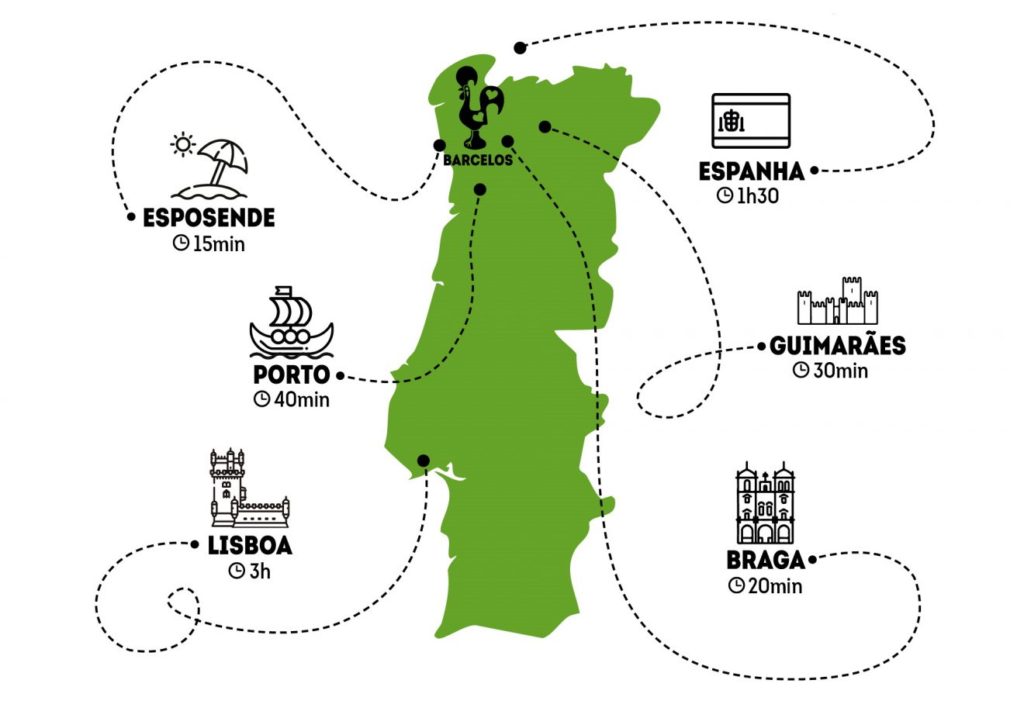
Portugal
Portugal is known for being a stable, safe and extremely beautiful country. It’s even considered one of the safest countries to visit in the European Union.
With a mild climate, good food and an incredible variety of landscapes, Portugal is the perfect place for a new adventure.
Geographical Location
Portugal, officially known as Portuguese Republic, is a southern European country founded in 1143 and occupying a total area of 92,212 km2. The mainland is located in the south-west of the Iberian Peninsula, bordering Spain to the north and east and the Atlantic Ocean to the west and south. Portuguese territory includes two autonomous regions: the archipelagos of Madeira and the Azores, in the Atlantic Ocean. The Madeira archipelago is composed by the islands of Madeira and Porto Santo and the island groups of Desertas and Selvagens; the Azores archipelago is made up of nine islands, Santa Maria, São Miguel, Terceira, Graciosa, São Jorge, Pico, Faial, Flores and Corvo, and several islets.
Official Language
Portuguese
Climate
The Portuguese climate is characterised by mild winters and pleasant summers, although this varies from region to region. In the north, rainfall is higher and temperatures lower, but the temperature range is greater inland.
In the southern part of the River Tejo, the largest river in the Iberian Peninsula, the Mediterranean influence can be felt, with hot, long summers and short, rainy winters. Madeira has a Mediterranean climate with mild and pleasant temperatures all year round, while the Azores have a temperate maritime climate with abundant rainfall.
Population
Portugal has a population of 10.6 million and a population density of 115.4 inhabitants/km2, with higher concentrations along the coastal strip.
Currency
Euro – €
About IPCA
The Polytechnic of Cávado and Ave is Portugal’s most recent public higher education institution, founded in 1994. Located in the northern region of Portugal, known for its significant economic activity and the youthfulness of its population, IPCA has played an important role as a development agent.
Most of its educational and scientific activities take place in the main campus, located in the historic and charismatic city of Barcelos. Despite its youth, its academic performance and applied research make IPCA a benchmark institution with a reputation for excellence at national and international level, with its duly accredited and innovative training offer.
We are a European University within the scope of RUN-EU, with unique exchange opportunities.
IPCA has five Schools in the fields of Design, Management, Hospitality and Tourism and Technology, which offer a wide range of Bachelor’s (1st Cycle), Master’s (2nd Cycle), Professional Higher Technical Courses (TeSP) and non-degree specialization programmes, in daytime, after-work and distance learning. A diverse student population together with the teaching and administrative staff make IPCA an important reference in the Portuguese higher education panorama.
Internationalization has been an IPCA´s strong commitment, with an intense range of activities, not only in Europe or with Portuguese-speaking countries, but also with other regions on different continents. Welcome to an institution that invests in education with responsibility, quality and excellence.
Location
Located in the beautiful Portuguese region of Minho, IPCA is headquartered in Barcelos and has several Campuses.
How to get to Barcelos

The main international airport that serves this region is the Francisco Sá Carneiro Airport, located in the city of Porto.
There are several means of transport available to get to Barcelos, whether you come from Porto or Lisbon. Besides the ease of travelling to Barcelos, you’ll also find that the Portuguese are hospitable and always willing to help whenever necessary.
From Porto Airport
Train
You can take the metro from inside the airport. This is an easy-to-use and economical means of transport. Access to the metro station is simple and practical, and is clearly signposted.
The metro runs from 6am until 1am, every twenty minutes. (More information at: https://en.metrodoporto.pt/)
From the airport metro station, take line E (purple) towards the “Campanhã” stop. Exit the metro station and walk 3 minutes towards Campanhã train station. The metro ticket costs around 2-3€ and the journey takes approximately 37 minutes.
At Campanhã station, you can buy your train ticket to Barcelos at the ticket machines or at the ticket offices, where you can get more useful information.
From Monday to Saturday, trains run from Campanhã to Barcelos between 6.05am and 10.10pm. (More information at: https://www.cp.pt/passageiros/en )
A train ticket costs around 6€. A ticket for the Alfa Pendular (high-speed train) costs around 25€. The journey to Barcelos will take around 1 hour.
You can find a taxi right outside Barcelos train station. The fare from the train station to the city center is approximately 5€. From the train station to IPCA campus, the fare would be about 7-10€.
Taxi
There are several taxi companies that serve Francisco Sá Carneiro Airport, right outside the Arrivals area.
You can also come to Barcelos by taxi. If you take/call a taxi during the regular operating hours, the cost of the trip to Barcelos will be around 70€-80€. During night time hours, it can be more expensive. Ask the driver the estimated cost. The trip takes 30 up to 40 minutes.
In case you arrive late at the airport, you might also consider staying overnight in Porto, and then come to Barcelos in the morning.
The trip from the airport to Porto city center takes an average of 20 to 30 minutes. The cost of the trip ranges from 30€ to 40€. You should note that the rates go up by 20% in the evening hours (from 9.00 pm to 6.00 am), and these changes are automatically reflected by the taxi meter. The surcharges also apply to weekends and public holidays.
Uber or Bolt
Uber and Bolt services are also available for this route. The trip from the airport to Barcelos will cost approximately 35-50€. The requests must be submitted directly through Uber or Bolt’s App. The trip takes 30 up to 40 minutes.
Bus
Another option is getting to Barcelos by bus. It might not be the best means of transport: it is not so convenient and it is not that flexible in terms of timetables. It only works from Monday to Friday.
Take the metro at Porto Airport metro station to Trindade train station. You should exit the train station and walk about 400 meters, up to 6 minutes towards Régulo Magauanha Street, where you will find the nearest bus station, by Transdev (bus company).
There are 4 buses going from Porto bus station to Barcelos, at 8.00 am, 11.00 am, 5.00 pm and 6.00 pm. From Porto, the bus goes to Póvoa de Varzim, and there you will have to change to another bus towards Barcelos. The trip from Porto to Barcelos takes about 2 hours.
You can also ask for further information when buying the ticket at the ticket office or the bus driver.
From Lisbon Airport
Train
The Humberto Delgado Airport, also known as Lisbon Airport, is the largest Portuguese airport, and it is located seven kilometers away from the city center.
The airport has a metro station inside.
From Lisbon Airport metro station, take the metro and follow the red line, towards Oriente train station (the trip takes about 9 minutes). You can buy the ticket at the vending machines or at the ticket office, where you can ask for further information.
Additional information about the Lisbon metro is available at https://www.metrolisboa.pt/en/.
At Oriente train station, you can buy the ticket to Barcelos, at the vending machines or at the ticket office.
Be aware that, in certain cases, you might have to change line and train at Nine train station. You can ask for further information, including timetables, at the train stations.
Cost of Living
For guidance only, here are some approximate costs:

Barcelos is one of the most affordable Portuguese cities to live and study. The cost of living for a student studying at IPCA depends on several factors, from the type of accommodation you find to whether you cook at home or have lunch/dinner out. In any case, the approximate cost could be around 400€ to 500€ per month.
Visa and Other Formalities
Students from the EU/EEA and Switzerland
Students from European Union (EU) countries, the European Economic Area/EEA (Iceland, Liechtenstein and Norway) and Switzerland do not need a visa to enter Portugal.
These students have the right to live in Portugal for up to 3 months without the need for any conditions and/or formalities other than holding a valid identity card or passport. However, if their stay is longer than 3 months, they must register to formalise their right of residence (Certificate of Registration) within 30 days of the first 3 months of entering national territory at the Town Hall in their area of residence.
Third-country students
Students who are nationals of other countries must obtain a residence visa for study before leaving their country of origin. They must apply for this visa at the nearest Portuguese Embassy or Consulate. To enrol at IPCA, they must present their study visa. Please note that a ‘tourist’ visa cannot be accepted.
After arriving in Portugal, it is important to emphasise that foreign students who enter Portugal via a border that is not subject to control (whose passport is not stamped on entry) must contact the SEF-Serviço de Estrangeiros e Fronteiras within three days of arriving in the country to declare their entry. After this deadline, they will have to pay a fine.
However, this information should be confirmed directly with SEF.
AIMA
Rua dos Granjinhos, 6
4710-352 Braga
Tel.: +351 217 115 000
Horário:
- Working Days: 08.30am – 07.00pm
Insurance
Students from European Union (EU) and European Economic Area (EEA) countries are covered by the European Health Insurance Card (EHIC), which allows them to benefit from the national social security system like any Portuguese citizen. To benefit from this system, students should contact their Social Security Centre and ask for the card to be issued before travelling to Portugal.
Students from outside the EU or EEA should make sure, before travelling, that they have health insurance to guarantee medical assistance during their stay in Portugal. In particular, Brazilian students, who are covered by Brazilian social security, can also request the “Certificado de Direito à Prestação de Cuidados de Saúde – PT/BR 13” form from the relevant institution in Brazil, in order to benefit from healthcare in Portugal, on equal terms with Portuguese nationals.
Upon arrival in Portugal, in order to enrol at IPCA, all students must present proof of insurance.
In addition, all students benefit from school insurance at IPCA which covers accidents occurring on the Institute’s premises (during school hours, during free time included in the respective timetable or during school, sporting or social events organised or authorised by the educational establishment), outside the Institute’s premises (academic excursions, outdoor classes and internships) and on the normal, direct route to and from home and the educational establishment.
It is important to mention that in the event of an accident, you should contact the GRI immediately so that you can report the incident to the insurance company, via IPCA’s Social Action Services (SAS), and all the necessary procedures can be triggered.
- Accommodation
The Polytechnic of Cávado and Ave (IPCA) does not have a University Residence with sufficient capacity to house mobility students, so IPCA’s Social Action Services provides a platform with offers of private accommodation, thus creating a database for students to choose their accommodation according to their preferences.
If students prefer, they can opt for alternative solutions such as temporary accommodation until they find permanent private accommodation after their arrival. In addition to the options mentioned above, the International Relations Office can provide additional support in finding accommodation.














